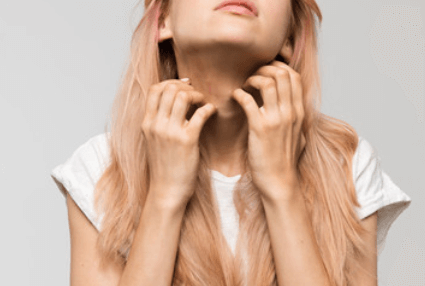The skin is the largest organ of the human body. It covers everything that is in us and protects us from environmental factors that otherwise could cause damage to delicate internal organs. Skin plays such an important role in our well-being and it is important to protect it from all the various issues that can arise! Let’s look at some skin rashes and remedies to help care for our skin.

Eczema or Atopic Dermatitis
Eczema is an allergy-related condition that affects your skin’s ability to retain moisture and protect you from bacteria, irritants, and allergens. Doctors have identified 4 types of eczema, all of these having similar symptoms. It is long-lasting with periodic flare-ups which may be accompanied by asthma or hay fever. Patients with eczema may experience dry skin, red or brownish-gray patches of skin on wrists, hands, feet, ankles, neck, upper chest, eyelids, elbow bends and the back of the knees. Some patients experience small, raised bumps that leak fluid and others experience thickened, cracked, and scaly skin. Because the most common complaint is itching, the skin often becomes sensitive and swollen from too much scratching.
Remedies:
If you feel you are experiencing eczema, there are several preventative steps that you can take.
- Moisturize your skin at least twice daily, especially after a bath or show while the skin is still damp.
- Keep your baths and showers short (10-15 minutes) using warm, not hot, water.
- Use mild soaps that do not have harsh perfumes or other chemicals.
- Pat your skin dry after bathing instead of vigorous rubbing motions.
- Identify triggers and avoid them as much as possible. (sweat, stress, soaps, perfumes, dust, pollen, or foods such as dairy, eggs, nuts, weeds, wheat, etc.)
Psoriasis
Psoriasis is a common chronic, inflammatory disease of the immune system and involves the skin and joints. Psoriasis occurs when the body sends faulty signals which tell the skin cells to grow too rapidly. The body does not shed these extra cells, so they pile onto the surface of the skin causing patches of red, raised skin which becomes scaly and itchy. Psoriasis can appear on the scalp, hands, feet, knees, and elbows. Patients suffering from psoriasis often report that they have times that it flares up, followed by times that it is less severe. Fortunately, the condition is not contagious.
Remedies:
The goal of treatments for psoriasis is to find the most effective way to slow cell turnover with the fewest possible side effects. These treatments are intended to reduce inflammation and clear the skin as well. There are three basic types of treatments available.
- Topical Treatments. Topical treatments include creams and ointments that are applied to the skin to treat mild to moderate psoriasis. These can include simple moisturizers or can contain salicylic acid, which promotes the sloughing off of dead skin cells.
- Light Therapy. Light therapy uses natural and artificial ultraviolet light exposure to UV rays to slow skin cell turnover, to reduce scaling, and to decrease inflammation.
- Oral and Injected Medications. Oral and injected medications contain ingredients that decrease the production of skin cells and suppress inflammation. Injectable treatments target specific parts of the immune system by blocking the action of the cells that play a major role in developing psoriasis.
Rosacea
Rosacea is a common chronic skin disease that primarily affects the face. It starts as a redness on the cheeks, nose, chin or forehead. This redness tends to come and go and it often resembles a sunburn that does not go away. You may feel burning or stinging sensations and have dry or rough skin. Small red solid bumps and pus-filled pimples can develop if rosacea is left untreated.
Remedies:
Treatments for rosacea include oral and topical medications, laser and light therapies, and can include surgical procedures.
Contact Dermatitis
Contact Dermatitis is developed by coming in contact with an allergen or irritant such as poison ivy, chemicals in cleaning products, latex, and more. This condition produces a very itchy, red rash with bumps and sometimes blisters.
Remedies:
The rash will go away with the use of medications. Some will respond to over-the-counter medications that can be applied to the skin to clear the rash. In extreme reactions, a physician should be consulted. After treating the rash, take extra care to avoid the irritant.
Drug Rash
Drug rashes are a side effect of taking medication.
Remedies:
It is important to consult your doctor when you have developed a rash from using prescription medication. These rashes usually disappear on their own when the medication is discontinued.
Is There a Treatment That Addresses a Combination of Skin Issues?
At Dermatology and Plastic Surgery of Arizona, we have a treatment that is suited for all skin types, aids in the improvement of acne/acne scarring, help control rosacea, treats pigmentation disorders, improves sun damage, and even improves the appearance of fine lines and wrinkles.
The Glycolic Peel is a great remedy for many common skin disorders. This chemical peel uses an acid solution to improve and smooth the texture of the skin by removing the outer layers which are damaged. It is one of the least invasive ways to improve your skin’s appearance and leave you feeling more confident as you face the world!
Take The Next Step
If you are ready to try the Glycolic Peel or any of our other skin treatments, it’s time to take the next step in achieving a healthier and more confident you! Schedule a consultation with the trusted medical professionals at Dermatology & Plastic Surgery of Arizona by calling the Tucson office at 520-207-3100 or the Sierra Vista location at 520-458-1787. We have offices in both Tucson and Sierra Vista.

